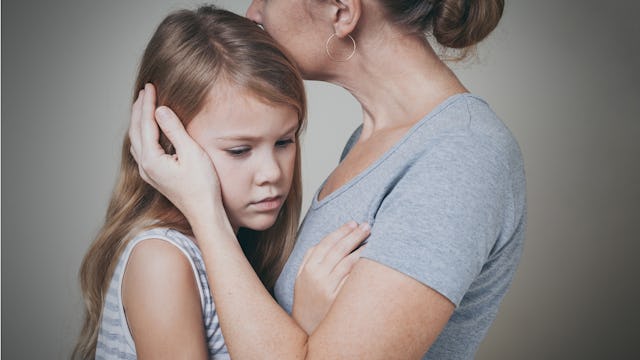Parents, Please Talk To Your Kids About Understanding Mental Illness

Our society has grown increasingly more accepting of kids with special needs, which is awesome, but we still have a long ways to go. The special needs of kids with common mental illnesses aren’t as visible or as clearly understood as they should be. Yet.
Our neurotypical kids may have friends with depression or anxiety, and they might feel frustrated or hurt when those friends back out of social activities or aren’t very communicative. It can be helpful to share with them what anxiety and depression does to a person’s brain and how it can make it challenging to do the things that most people take for granted.
Your children might be friends with my daughter. They’d probably love her — she’s kind and funny and a genuine joy to be around…when she shows up. But sometimes she only shows up for part of the time. Sometimes she’s quiet. Sometimes she’s distracted. Sometimes she has to leave abruptly without much of an explanation.
Sometimes she says yes to hanging out and then backs out at the last minute. That happens pretty often, actually.
It would be easy for your child to think that their friend, my daughter, isn’t a great friend. They might think she’s lost interest in them or that she doesn’t enjoy their company. They might be offended that she’s constantly flaking out.
They might not know she suffers from a debilitating anxiety disorder. They might not know that she’d give anything to be able to enjoy hanging out and leave the house without a second thought, but that frequently her brain won’t let her do it.
Raising a child with a mental health issue has been an eye-opening experience. So many behaviors that I’ve witnessed my whole life suddenly make a lot more sense. People I may have previously written off as flaky or unreliable, I now see in a whole new light. I wonder how many people I thought were unsocial or lacking in manners were really just struggling with anxiety or depression or some other mental health challenge.
It’s estimated that 1 in 5 American adults experience mental illness in a given year. According to the National Institute of Mental Health, 46.3% of 13–18-year-olds have experienced a mental health disorder, and 21.4% have experienced a “severe” disorder. That means that our kids know a lot of children who are dealing mental health challenges at any given time.
But those of us who haven’t experienced such things can have a hard time understanding what it’s like for those who have. That’s why it’s vital for parents to educate themselves and help teach their children about how mental health issues can affect a person.
First, it’s important to teach kids that the vast majority of people with mental health disorders are not “crazy,” nor are the vast majority dangerous. Their brains simply have a hard time doing certain things that other people’s brains do automatically.
For example, my daughter obsesses about worries most of us are able to momentarily experience and then brush off. Her brain doesn’t do the brush-off, no matter how many times she tells it to. She’s getting therapy so that she can train her brain to do it, but in the meantime, she ditches her friends more often than she wants and has a hard time doing many things most of us take for granted.
She doesn’t suffer from depression, but some of the outward symptoms are similar. If her friends didn’t know she had anxiety, there’s a good chance that they’d make assumptions about her personality or attitude that were erroneous. Thankfully, she agreed to let me tell her friends’ moms about her illness, so that they could help them understand why she bails on them sometimes and help them not take it personally.
When my daughter is in a healthy mindset, she can talk with her friends about her anxiety, but when she’s feeling good, she wants to just be normal. She doesn’t want to spend the fun times she has with her friends talking about her anxiety. But it’s important for her friends to know about it. It’s been more helpful for me to explain it to them or for their parents talk with them about it in ways that make sense to them.
Your children probably know and love more people with mental health issues than they are aware of. When people’s struggles are mostly internal, it’s a challenge for everyone involved. The more those of us who don’t struggle with mental health can try to understand those who do, the better. Removing the stigma and encouraging empathy might just save all of our children from losing valuable relationships.